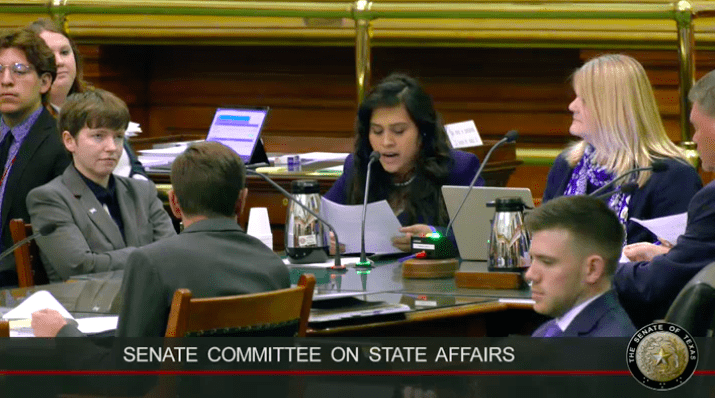Legislation that would protect women’s sports from men masquerading as women is moving in the Texas Senate, receiving a hearing in the State Affairs Committee this week.
State Sen. Mayes Middleton (R–Wallisville) filed Senate Bill 15, which requires athletes competing in intercollegiate athletics to compete on the team corresponding to the athlete’s biological sex, as stated on the student’s birth certificate. Middleton said students should be required to compete “based on their God-given biological gender.”
SB 15 is one of Lt. Gov. Dan Patrick’s priorities for the session and includes 17 original authors in addition to Middleton, all of whom are Republicans.
The controversy over biological men participating in women’s sports has erupted in recent years, and it was thrust into the national spotlight when University of Pennsylvania “transgender” swimmer William Thomas (who now goes by Lia) consistently dominated his female competition and won the 2022 NCAA Division I national championship in the 500-yard freestyle event. Thomas was ranked 462nd in the men’s division the previous year.
Riley Gaines, a 12-time NCAA All-American Swimmer, spoke to the Senate committee regarding her tie with Thomas in the 200-yard freestyle event. Gaines said that during the awards ceremony, “having only one trophy, the NCAA handed the trophy to Thomas and told me to go home empty-handed because Lia had to hold the trophy for photo purposes.”
I felt betrayed and belittled and like my efforts and the sacrifices that I had made had been reduced to a photo op to validate the identity and feelings of a male.
Besides the loss of recognition and opportunities for female collegiate athletes, Gaines brought up another troubling issue with allowing gender-confused males to compete with females.
The NCAA forced female swimmers to share a locker room with Thomas, a 6-foot-4-inch 22-year-old male equipped with and exposing male genitalia in a room full of vulnerable, undressed women.
“We were not forewarned about this arrangement,” said Gaines. “We did not give our consent, and we were not asked for our consent.”
Cindy Castilla of the Texas Eagle Forum echoed Gaines, raising concerns over the unique physical differences that separate men from women and calling into question the safety of allowing men into women’s private spaces—like locker rooms.
“We have historically separated males and females in sports by the time they reach high school for good reason,” said Castilla. “When a biological male joins a girls’ sports team, statistics show he will present stronger than 95 percent of the females trying out.”
Additionally, “having biological males on a girls’ team creates locker room and travel and house issues, and this is a privacy issue for the females,” said Castilla.
Darren Keyes, senior counsel with Alliance Defending Freedom, informed the committee that “protecting fairness for women athletes fully aligns with both the U.S. Constitution and federal law. The U.S. Supreme Court has held that schools and colleges can maintain separate programs for men and women based on ‘physiological differences between male and female individuals.’”
However, not all citizens were in favor of the measure.
Dr. Susannah Carranza spoke against SB 15, stating, “This bill does nothing to protect women. If you really want to protect women, pass red-flag laws, allow women to make reproductive choices, support equal pay for equal work. This bill has nothing to do with fairness. This bill has everything to do with prejudice.”
El Paso County Commissioner David Stout also testified against SB 15, arguing that “Texas leads the nation in transgender murders” and that the bill “furthers the discrimination already felt by transgender individuals.”
Brian Klosterboer with the American Civil Liberties Union of Texas called SB 15 “immensely cruel” and “unscientific.” He added, “We should trust the experts. We shouldn’t have the government conflicting with the NCAA.”
In 2020, Idaho became the first state to implement this kind of restriction, setting off a flurry of activity in dozens of other states attempting to do the same. Currently, 18 states—mostly in the South, Midwest, and Mountain West—have enacted laws prohibiting biological males from participating in women’s sports, and several others have proposed legislation to do so.
Last session, lawmakers enacted legislation to protect girls participating in K-12 UIL sports in Texas. SB 15 would expand the protections to collegiate athletics.
After the testimony, SB 15 was left pending in the committee.
Similar legislation has been filed in the Texas House by State Rep. Valoree Swanson (R–Spring). It has been referred to the House State Affairs Committee.
No ads. No paywalls. No government grants. No corporate masters.
Just real news for real Texans.
Support Texas Scorecard to keep it that way!





